

The CJEU's Google Spain decision: a right to be forgotten within the limits of the freedom of expression. In its ruling of May 13, 2014, the Court of Justice of the European Union (CJEU) holds that: Concerning this last point, the court also links these rights to the right to "privacy" and insists that, in certain occurrences, the right of erasure or the right to object would be ineffective when the balance of interest between freedom of expression and privacy favors freedom of expression.
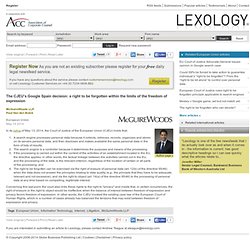
In other words, the CJEU invoked the existing case law of the European Court of Human Rights, which in a number of cases already has balanced the tensions that may exist between freedom of expression and privacy. Business Matters: The First Week With Google's Anti-Piracy Search Algorithm. Google changes algorithm to demote pirated content in search. The algorithm change will roll out this week and will mean that for the first time, all valid copyright removal notices Google receives will be taken into account.

As a result, sites with high numbers of removal notices may appear lower in its search results. The move will come as a victory for media and film companies, which have long complained that Google does not do enough to protect copyright holders' material. Google va sanctionner les sites pirates signalés par les ayants droit. À partir de cette semaine, Google va commencer à pénaliser les sites pour lesquels il reçoit le plus grand nombre de demandes de suppression de la part des ayants droit.
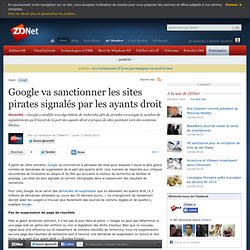
Une manière de répondre aux critiques récurrentes de l’industrie du disque et du film qui accusent le moteur de recherche de faciliter le piratage. Les sites les plus signalés se verront rétrogradés dans le classement des résultats de recherche. Pour cela, Google va se servir des demandes de suppression que lui adressent les ayants droit (4,3 millions de demandes adressées au cours des 30 derniers jours). « Ce changement de classement devrait aider les usagers à trouver plus facilement des sources de contenu légales et de qualité », explique Google.
Pas de suppression de page de résultats Mais le géant américain prévient, il n’est pas là pour faire la police. « Google ne peut pas déterminer si une page web en particulier enfreint ou non la législation des droits d’auteur. Google to skew search results to punish PIRATES. High performance access to file storage Online copyright infringers take note.
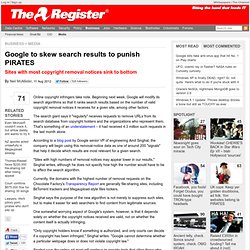
Beginning next week, Google will modify its search algorithms so that it ranks search results based on the number of valid copyright removal notices it receives for a given site, among other factors. The search giant says it "regularly" receives requests to remove URLs from its search database from copyright holders and the organizations who represent them. That's something of an understatement – it had received 4.3 million such requests in the last month alone. According to a blog post by Google senior VP of engineering Amit Singhal, the company will begin using this removal-notice data as one of around 200 "signals" that help it decide which results are most relevant for a given search. "Sites with high numbers of removal notices may appear lower in our results," Singhal writes, although he does not specify how high the number would have to be to affect the search algorithm.
Google va sous référencer les contenus souvent dénoncés par les ayants droit. Durant les débats Hadopi en 2009, Franck Riester voulait que le contenu légal soit surréférencé.
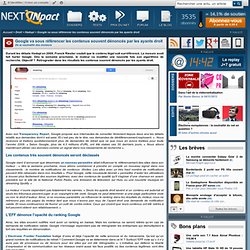
La mesure avait fait hurler Google. Dès la semaine prochaine, le moteur va modifier une nouvelle fois son algorithme de recherche. Objectif ? Rétrograder dans les résultats les contenus souvent dénoncés par les ayants droit. Avec son Transparency Report, Google propose aux internautes de consulter librement depuis deux ans les détails relatifs aux demandes dont il est saisi. Les contenus très souvent dénoncés seront déclassés Google vient d’annoncer que désormais un nouveau paramètre allait influencer le référencement des sites dans son moteur : « dès la semaine prochaine, nous allons commencer à prendre en compte un nouveau signal dans nos classements : le nombre de notifications de contenus illicites.
Le moteur n’ouvre cependant pas totalement les vannes. « Seuls les ayants droit savent si un contenu est autorisé et seuls les tribunaux peuvent juger si un copyright a été violé. YouTube may escape Google’s punishment for too many DMCA take-downs. Google is opening up more channels for fielding copyright complaints about YouTube videos, thanks to a change in how the company monitors Digital Millennium Copyright Act (DMCA)takedown requests via web search.
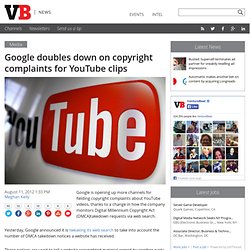
Yesterday, Google announced it is tweaking its web search to take into account the number of DMCA takedown notices a website has received. These notices are used to tell a website copyrighted material owned by another party is being used somewhere on the site and that the copyright owner would like it taken off. Google, whose highly-ranked search engine results drive tons of traffic to websites every day, will push websites with too many DMCA takedown notices lower down the search results page.
The search company, which owns YouTube, already takes into account complaints submitted via YouTube. YouTube has its own request form that is not connected to DMCA requests. Google Appeases Hollywood But Rankles Internet Freedom Watchers. Google's nod to Hollywood with its decision to demote in its search results sites accused of copyright infringement raises questions about fairness and the ability of suspected violators to challenge the move.

The Motion Picture Association of America has praised the Internet search leader's announcement on Friday, while some advocates of Internet freedom have panned it or had a lukewarm response. Every so often, Google changes its search algorithms and when it does everyone wonders how search results will change. The company says that starting next week, sites with high numbers of removal notices for infringing copyright may appear lower in search results. "This ranking change should help users find legitimate, quality sources of content more easily -- whether it's a song previewed on NPRs music website, a TV show on Hulu or new music streamed from Spotify," Engineering SVP Amit Singhal wrote in a Google blog post.
Happy Hollywood. Google va sous référencer les contenus souvent dénoncés par les ayants droit. How YouTube Will Escape Google's New Pirate Penalty. Google has announced that it will soon penalize sites that are repeatedly accused of copyright infringement.

But one site in particular doesn’t need to worry: Google’s own YouTube. It has a unique immunity against the forthcoming penalty. POSTSCRIPT: Please also be sure to read our follow-up article, Google: Many Popular Sites Will Escape Pirate Penalty, Not Just YouTube The penalty — which we’ve dubbed the Emanuel Update — impacts Google’s web search results. If someone has reported a web search listing as being a copyright violation, using the DMCA takedown mechanism, that’s a strike against the entire site. Accumulate enough strikes (how many, Google’s not saying), and a publisher may find their entire site hit with a penalty. Strike Count Against Publishers If you’re trying to understand what sites might be at risk, Google has a page where it discloses which publishers have the most takedown strikes against them: The YouTube Escape Hatch. Google "demotes" repeat offenders. Google URL Takedown Requests Up 100% In a Month, Up 1137% On 2011.
The massive wave of DMCA takedowns sent by rightsholders to Google in recent months is growing at an astonishing rate.
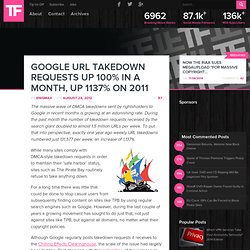
During the past month the number of takedown requests received by the search giant doubled to almost 1.5 million URLs per week. To put that into perspective, exactly one year ago weekly URL takedowns numbered just 131,577 per week, an increase of 1,137%. While many sites comply with DMCA-style takedown requests in order to maintain their ‘safe harbor’ status, sites such as The Pirate Bay routinely refuse to take anything down. For a long time there was little that could be done to stop casual users from subsequently finding content on sites like TPB by using regular search engines such as Google. However, during the last couple of years a growing movement has sought to do just that, not just against sites like TPB, but against all domains, no matter what their copyright policies.
Following that article the bar was raised again during the week starting July 17. Google Caves To Hollywood Pressure: Will Now Punish Sites That Get Lots Of 'Valid' DMCA Notices. For quite some time the RIAA and MPAA have been going on and on about how Google can just "fix" its search results by either removing or punishing sites that are deemed as "pirate" sites.
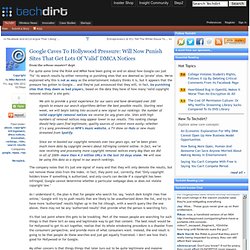
We've explained why this is not as easy as the entertainment industry thinks it is, but it appears that the pressure has gotten to Google... and they've just announced that they will, in fact, be punishing sites that they deem as bad players, based on the data they have of how many "valid copyright removal notices" a site gets: We aim to provide a great experience for our users and have developed over 200 signals to ensure our search algorithms deliver the best possible results. Starting next week, we will begin taking into account a new signal in our rankings: the number of valid copyright removal notices we receive for any given site.
An update to our search algorithms. Laurence Kaye on Digital Media Law: Google News - hasta la vista. Dear reader I've written on a number of occasions over the years on how the liability position of Google and other intermediaries is shifting from a simple "I'm just a host, so don't look to me" to one of increasing responsibility. In the Court of Justice of the EU's decision in Google Spain and Google, Inc vs.
AEPD (Spanish Data Protection Authority) and Snr. Gonzalez, the Court was clear that Google, Inc was a 'data controller' and so within scope of European data protection law. Yesterday, Google announced that it is shutting down Google News in Spain, responding to the forthcoming introduction - Happy New Year Google, on 1/1/15 - of the 'canon AEDE' which introduces a new statutory copyright limitation which allows the use of 'press snippets' but carries a price tag for intermediaries in the form of fair compensation. Not all press publishers welcome the legal changes as they fear Google switching off the service may result in a loss of traffic to their sites.